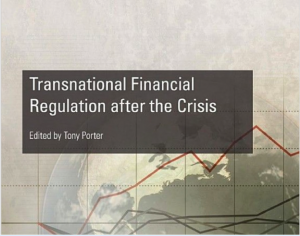
Several years ago, in an article published in a book covering the financial crisis, I along with my wife Rachel Loko wrote on the politics of transatlantic credit rating agency regulation. Among the things we noted was the heightened sensitivity to the operation of CRAs in light of the financial crisis, and the exposure of European banks to the US credit default swap market.
Fast forward, and derivatives remain a point of contention in transatlantic financial coordination—so much so that US President Trump has received a briefing on the topic. According to the Wall Street Journal,
President Donald Trump met with the top U.S. derivatives regulator in the Oval Office on Wednesday, amid tensions between American and European policy makers on their efforts to coordinate on postcrisis regulation […]
At issue in Wednesday’s briefing: a 2016 deal struck between regulators in Washington and Brussels in which European policy makers agreed to recognize certain U.S. rules as equivalent to those in Europe. U.S. officials now fear Brexit negotiations might essentially override that agreement, the person said, as European officials seek to maintain oversight of certain firms based in or operating out of London post-Brexit.
Mr. Giancarlo has warned the Brexit negotiations could lead to new regulations that reach far beyond London. One proposal, he said, could lead to on-site inspections of U.S. firms such as CME Group Inc.without informing its primary regulator, the CFTC. Another could enable European policy makers to impose new regulations on U.S. businesses without informing or consulting the commission.
I’ll be curious to see just how these concerns translate into US policy. One might imagine derivatives comprising yet another front—perhaps a truly belligerent one—on a number of international disputes with European officials. But I’m not so sure. First, the US ability to dictate EU terms with regards to its extraterritorial policy is probably about as strong as the EU’s ability to dictate how the US applies its laws extraterritorially. Which means, not so much (see, Dodd Frank). And the outcome of any truly hostile disagreement would be far from certain given the size of the European and US derivatives markets. No one would come out unscathed.
However, these developments are instructive in two ways that I think are rather overlooked. First, it helps to remind the US that the EU’s policies for Brexit as a third country necessarily will have an impact on other third countries, including the United States. And to the extent to which there is a “hard” Brexit, where the EU takes a somewhat retaliatory stance towards the UK, the United States could internalize some of the costs of Europe’s political discensus. Second, the CFTC’s unease highlights Obama-era concerns that the European Union does not have a fully operationalized notice-and comment apparatus permitting foreign regulators and market participants to fully articulate their concerns with EU rules. A little more administrative law in one of the world’s most sophisticated bureaucracies could go a long way to helping smooth recurring cross-border tensions.
